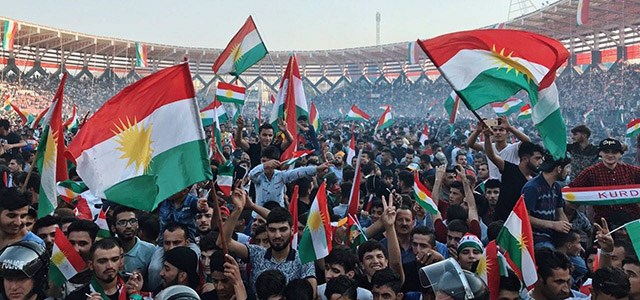Kurdish independence has arguably been one of the most long-standing struggles for self-determination. But with independence referendums taking flight across the world, what makes the Iraqi Kurds’ claim to autonomy more, or less, legitimate? The answer some use is ethnicity. Others look to the historical persecution of the Kurds. These two reasons don’t exist in isolation as Kurdish nationalism is rooted in stories of collective struggle and subsequent ethnic unity.
The emphasis on ethnic identity in the Kurdish nationalist movement is one that reflects the sectarianism that troubles Iraq. Ethnicity is often used as a tool of political mobilization and myth building. Seeing ethnicity as ‘historical’ and ‘essential’ difference amongst groups is one the world needs to be vigilant of, especially when it is used as justification for independence. Not only is this rhetoric divisive, it doesn’t align with modern notions of state sovereignty. This begs the question: who are the Kurds?
The Kurds: Then and Now
The Kurds are an ethnic group that span across the Middle East’s hastily drawn borders. They are the fourth largest ethnic group in the region, with population estimates between 25 to 35 million. They live mainly in parts of Turkey, Iraq, Iran and Syria. The Kurds of Northern Iraq have their own semi-autonomous region run by the Kurdistan Regional Government (KRG).
Tensions between KRG and the Iraqi government escalated in 2014 over issues of funding, sale of oil and the disputed territory of Kirkuk. Complete autonomy from Iraq became a clearer goal. The referendum held this September was a step towards this goal. Results showed a 72% voter turnout, 93% of whom voted in support of independence. However, the referendum was rejected by the Iraqi government. It is obvious that the referendum was symbolic, if anything. It was used to legitimize Kurdish President Barzani’s government during a time of dwindling political unity. It revived the Kurdish nationalist movement.
The first signs of Kurdish ethno-nationalism can be seen in the years preceding World War 1. In the midst of a weakening Ottoman empire, the Kurds saw the opportunity of self-determination. Years later, this opportunity took form in the Treaty of Sevres of 1920, which promised Kurdish autonomy. However, the Treaty of Lausanne replaced this treaty in 1923. It drew up the territorial boundaries of the Middle East without considering a Kurdish state. Ever since, there has been a conflict between the Iraqi state and its Kurdish minority over issues of self-determination.
Kurdish Self-Determination
An idea used to justify the need for Kurdish autonomy is self-determination. According to the International Covenant on Civil and Political Rights, “all peoples have the right to self-determination”. Kurds have worked to gain claim over their own sovereign state on these grounds.
National identity is crucial to the claim for self-determination and the Kurds have built one around their shared ethnic experience. The construction of this ethnic identity lies in a common language, culture, and history.
I believe that ethnic identity and national identity need to be distinct from each other. A nation built on self-identification through ‘other-ing’ does not stand a strong chance for peace and stability. While I recognize the importance of considering history, and how persecution does influence a groups self-identification and desires, the precedent of such separations does not provide much hope.
Fundamentally, the Kurds want to be able to practice their culture and live their true identities without fear of discrimination or violence. This is rooted in the Kurdish experience of persecution, which binds their large community under one collective ethnic identity. However, the emphasis of Kurdish persecution changes the argument; from ethnicity comprising as an automatic path to independence to one of brutal oppression of Kurds by the majority population and governments. The Iraqi government can be criticised for failing to uphold the rights of minorities like the Kurds. This changes how their desire is framed and can be seen as more legitimate grounds for Kurdish secession. Comparatively, the push for an Israeli state and its eventual creation in 1948 is an example of why this argument is more plausible.
Yet, international norms have stepped away from the idea that the ‘essence’ of sovereignty can be granted purely on grounds of a defined population’s desires for self-rule. Iraq, as a multiethnic state, has responsibilities to uphold the rights of individuals and in particular its minorities. Thus, the issue of Kurdish persecution becomes less of a claim for self-determination in itself but more of an indication of the failures of the Iraqi government.
A distinction exists between state and national sovereignty. Kurdish claims to national sovereignty are legitimate. They make up a distinct population united by their ethnicity. Decades of persecution, particularly brutal under the Ba’athist regime, help further legitimize their claim. In contrast, state sovereignty requires proof of institutions that hold authority over this population. This is where the argument for self-determination based off of ideas of ethnic differences and persecution fall apart. The Kurdish state could only exist autonomously if it had the national unity and the institutions to back their power.
Us and Them
Moreover, the separation of groups by different, but forged, ethnic identities is precarious. Ethnic groups are constructed to be seen as ‘natural’ and ‘primordial’. Such perceptions allude to concepts of an ‘ancient hatred’. In November 2016, Amnesty International accused Kurdish forces of war crimes in the Kirkuk region as they forcefully drove out and damaged homes of Arabs. This is an example of the inevitability of conflict in issues that tap into a sectarian fervor.
More importantly, Kurdish nationalist movements’ dangerous emphasis on ethnicity threatens modern notions of multiethnic states. The following quote from an Al Jazeera article explains this well:
The upcoming referendum, far from fostering “a pole of stability” in the region, goes against any inclusive dimension and is based on an outdated theory of secession that posits linguistic, ethnic or religious homogeneity as legitimate solutions
– ‘Kurdish independence vote: A historical perspective’ by Lorenzo Kamel for Al Jazeera News
Stronger institutions can lead to stronger state-building, which is more effective in maintaining peace and stability in society than archaic notions of ethnic homogeneity. Using the excuse of ethnicity allows for leaders and states to delineate responsibility away from themselves.
But, painting the picture of ethnic and political solidarity amongst the Kurds is too simplistic. Ethnicity alone fails to secure the unity required for nation building. This can be seen in the intense rivalry between political parties in the KRG, who have fallen in and out of open conflict since the 1980s. One reason for this is when ethnic identities are poorly forged for political purposes.
Divisive religious and tribal identities challenge broader ethnic and national unity needed for solidarity. The Kurds are a diverse group with respect to religious beliefs. 75% of Kurds are Sunni Muslim, with minority communities of Shia Muslim, Yezidi, Zoarastrian, Christian and others. The move for independence has largely been driven by orthodox Muslims. Also, Kurdish communities are extremely tribal. Tribalism takes the form of different dialects and kinship, acting often as a unit in the political structure. Tribal loyalties transform into political parties. These ‘neo-tribes’ threaten the values of democracy that elite intellectuals have been working towards. In this way, religious and tribal divisions hinder efforts to create a unified ‘people’.
Ultimately, the question of legitimacy for Kurdish independence does not have a definite answer. Ethno-nationalism is dangerous. It is also constructed and constructed poorly. On the premise of both state and national sovereignty, the Kurds must work to establish stronger institutions and reduce infighting amongst political factions informed by religious and tribal differences. We must also recognize the shifts in international norms on self-determination. A defined population is not nearly enough justification for self-rule. It would disturb the political order in a world of current and increasingly multi-ethnic states. The history of brutal oppression of the Kurds does change the picture, and arguments justifying autonomy on this basis are more widely accepted by the international community.
Featured Image Source: http://www.rudaw.net/english/kurdistan/140920175






Be First to Comment